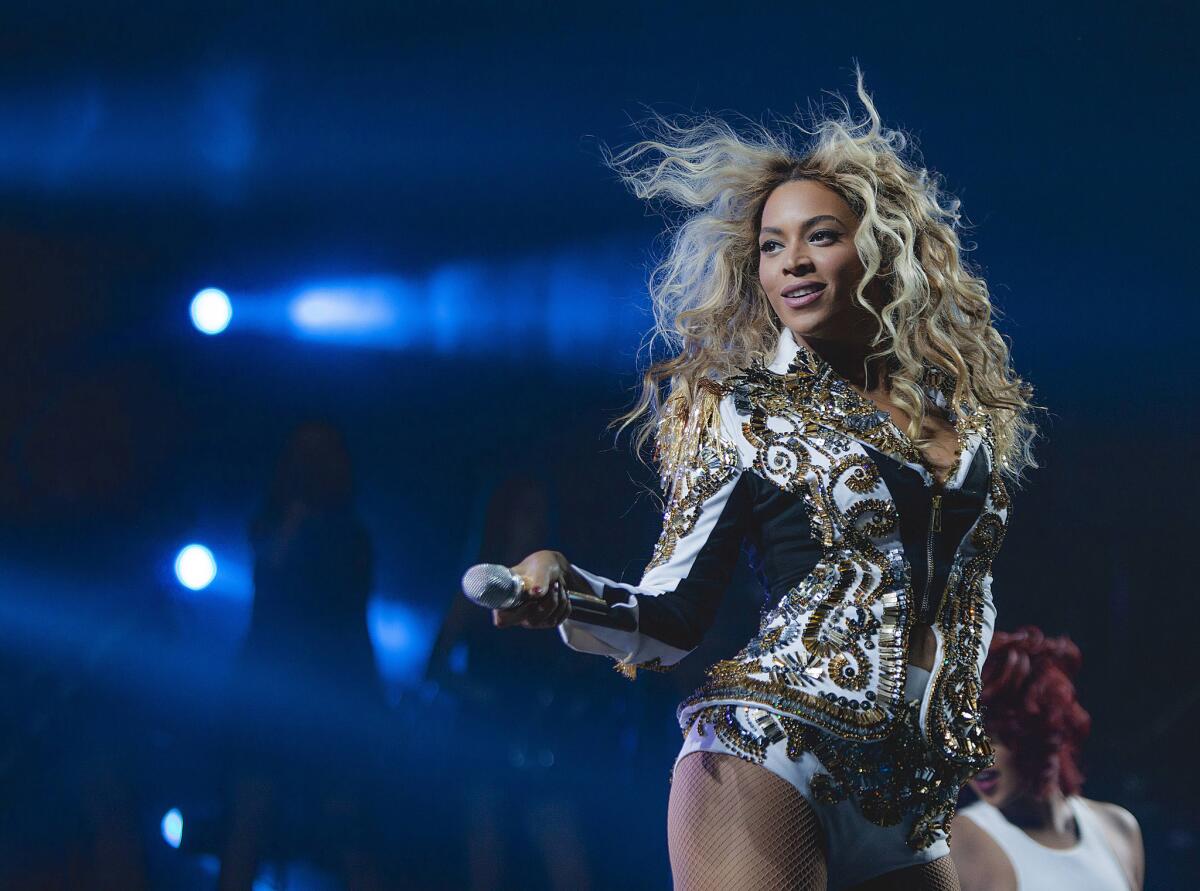Quiet the LGBT backlash: Beyonce’s album empowers us all

- Share via
This month, Beyonce’s new self-titled “visual album” all but broke the Internet, moving more than 828,000 copies internationally in its first three days on iTunes with no prior promotion. But despite its media-shattering debut and glowing reviews, Slate’s Matt Capetola argued that the album left something to be desired: “Beyonce” ignored its gay audience.
“It dawned on me, though, after I drooled over the album’s 17 videos for about the fourth time, that it featured not a single unambiguous nod to LGBTQ rights,” Capetola writes. “It’s a strange choice. After all, Beyonce certainly commands legions of gay fans, and we live in a time when it is easier than ever to fight for gay fan bases without facing career backlash. Her reticence might fairly lead one to wonder if she really cares about LGBTQ rights.”
As a gay man, Capetola wants to know if Beyonce “has [his] back.” My question is: Why does it matter? Although female pop stars like Katy Perry and Kesha have made headlines for singing for gay fans on their records, Beyonce’s lack of explicit inclusion says little about her worldview — and more about Capetola’s. She doesn’t have to call out everyone’s name for us to know we’re part of the crowd.
YEAR IN REVIEW: 10 groundbreaking women we lost in 2013
Capetola’s critique speaks to an increasing trend in culture in which we need to be directly addressed by our media to feel included. Our Facebook page begins by asking us what’s on our mind — the engine of the social media experience — and Hulu inquires about our advertising preferences in order to cater an experience especially designed for us. Earthlink’s slogan puts it more simply: “We revolve around you.”
Nicholas Negroponte, co-founder and director of the MIT Media Laboratory, coined the phrase “The Daily Me” to define this phenomenon of becoming the center of our own media universes. And according to New York Times columnist Nicholas Kristof, it’s a product of the digital age. “When we go online, each of us is our own editor, our own gatekeeper,” Kristof wrote. “We select the kind of news and opinions that we care most about…. The effect of The Daily Me would be to insulate us further in our own hermetically sealed ... chambers.”
Although Kristof was talking about news media and politics, The Daily Me speaks much larger volumes about an Internet echo chamber in which all we hear are ourselves. Researchers suggest that the “culture of customization” that Negroponte and Kristof described is contributing to a “narcissism epidemic.”
YEAR IN REVIEW: Meghan Daum’s overrated and underrated 2013 list
Commenting on this cultural shift for the Atlantic, Bill Davidow points to Elias Aboujaoude, a professor of psychiatry at Stanford.
He observes, “This shift from e- to i- in prefixing Internet URLs and naming electronic gadgets and apps parallels the rise of the self-absorbed online Narcissus.” He goes on to state that, “As we get accustomed to having even our most minor needs ... accommodated to this degree, we are growing more needy and more entitled. In other words, more narcissistic.”
In addition to changing our relationship with technology, the culture of customization is also influencing the way we consume and make music. As the New York Times explained in its Science section:
After a computer analysis of three decades of hit songs, Dr. [Nathan] DeWall and other psychologists report finding what they were looking for: a statistically significant trend toward narcissism and hostility in popular music. As they hypothesized, the words “I” and “me” appear more frequently along with anger-related words, while there’s been a corresponding decline in “we” and “us” and the expression of positive emotions.
In many ways, Beyonce’s record is an important break with iCulture. Although her music is, on the surface, focused on self-care (with lyrics about loving herself and taking control of her sex life), her self-titled record speaks to something greater than herself: female empowerment. Her album is about community care, with frank discussions about issues women face, such as postpartum depression and body insecurity.
In the album’s most powerful moment, Beyonce samples a TED Talk from Nigerian author Chimamanda Ngozi Adichie, entitled “We Should All Be Feminists.”
“We teach girls to shrink themselves, to make themselves smaller,” Adichie argued. “We raise girls to see each other as competitors — not for jobs or for accomplishments, which I think can be a good thing, but for the attention of men. We teach girls that they cannot be sexual beings in the way that boys are. Feminist: the person who believes in the social, political and economic equality of the sexes.”
Adichie’s words have the ability to speak to all of us, whether we are female, feminist, gay or any other human with ears and a heart. To understand what Adichie is trying to say, Beyonce doesn’t have to direct her music specifically to gay men like Capetola. We can all feel stronger when those around us are empowered.
One of the dangers of social media narcissism is that we must feel like we are “always on,” forever the one whose worldview needs to be the center of attention. But if there’s anything to be learned from Beyonce, it’s the power of stepping back and letting others have a voice too.
ALSO:
A Prop. 8-style attack on transgender student rights
Let’s pluck ‘Duck Dynasty’ and sweep away trailer-trash TV
The night L.A. vice netted Peter O’Toole and Lenny Bruce: by Joseph Wambaugh
Nico Lang is a contributor at Thought Catalog and co-editor of the “BOYS” anthology series. Follow Nico on Twitter @Nico_Lang.
More to Read
A cure for the common opinion
Get thought-provoking perspectives with our weekly newsletter.
You may occasionally receive promotional content from the Los Angeles Times.










